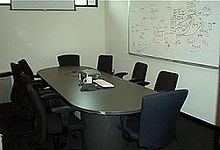Meeting: Difference between revisions
| Line 51: | Line 51: | ||
* [[Minutes]] |
* [[Minutes]] |
||
* [[Official trip]] |
* [[Official trip]] |
||
* [[Offsite Retreat]] |
|||
* [[Organizational development]] |
* [[Organizational development]] |
||
* [[Quaker]] [[meeting for worship]] |
* [[Quaker]] [[meeting for worship]] |
||
* [[Retreat, Offsite]] |
|||
* [[Scientific meeting]] |
* [[Scientific meeting]] |
||
* [[Task list]] |
* [[Task list]] |
||
Revision as of 12:29, 11 September 2008

In a meeting, two or more people come together for the purpose of discussing a (usually) predetermined topic such as business or community event planning, often in a formal setting.
In addition to coming together physically (in real life, face to face), communication lines and equipment can also be set up to have a discussion between people at different locations, e.g. a conference call or an e-meeting.
In organizations, meetings are an important vehicle for personal contact. They are so common and pervasive in organizations, however, that many take them for granted and forget that, unless properly planned and executed, meetings can be a waste of time and resources.
Because of their importance, a career in professional meeting planning has emerged in recent years. In addition, the field of Meeting Facilitation has formalized with an internationally-recognized "Certified Professional Facilitator" designation through the International Association of Facilitators (IAF)
Types of meetings

Meetings may be divided into many categories:
- Status Meetings, generally Leader-led, which are about reporting by one-way communication;
- Work Meetings, which produce a product or intangible result such as a decision
- Staff meeting -- typically a meeting between a manager and those that report to the manager (possibly indirectly).
- Team meeting -- a meeting among colleagues working on various aspects of a team project.
- Ad-hoc meeting -- a meeting called together for a special purpose
- Management meeting -- a meeting among managers
- Board meeting -- a meeting of the Board of directors of an organization
- One-on-one meeting -- a meeting between two individuals
- Off-site meeting -- also called "offsite retreat" and known as an Awayday meeting in the UK
- Kick-off Meeting-- is the first meeting with the project team and the client of the project to discuss the role of each team member
- Pre-Bid Meeting-- is a meeting of various competitors and or contractors to visually inspect a jobsite for a future project. The meeting is normally hosted by the future customer or engineer who wrote the project specification to ensure all bidders are aware of the details and services expected of them. Attendance at the Pre-Bid Meeting may be mandatory. Failure to attend usually results in a rejected bid
Meeting styles
- stand-up meeting
- breakfast meeting
- off-site meeting
- lunch meeting
Meeting frequency options
Since a meeting can be held once or often, the meeting organizer has to determine the repetition and frequency of occurrence of the meeting. Options generally include the following:
- A one-time meeting is the most common meeting type and covers events that are self-contained. While they may repeat often, the individual meeting is the entirety of the event. This can include a 2006 conference. The 2007 version of the conference is a stand-alone meeting event.
- A recurring meeting is a meeting that recurs periodically, such as an every Monday staff meeting from 9:00AM to 9:30 AM. The meeting organizer wants the participants to be at the meeting on a constant and repetitive basis. A recurring meeting can be ongoing, such as a weekly team meeting, or have an end date, such as a 5 week training meeting, held every Friday afternoon.
- A series meeting is like a recurring meeting, but the details differ from meeting to meeting. One example of a series meeting is a monthly "lunch and learn" event at a company, church, club or organization. The placeholder is the same, but the agenda and topics to be covered vary. This is more of a recurring meeting with the details to be determined.
